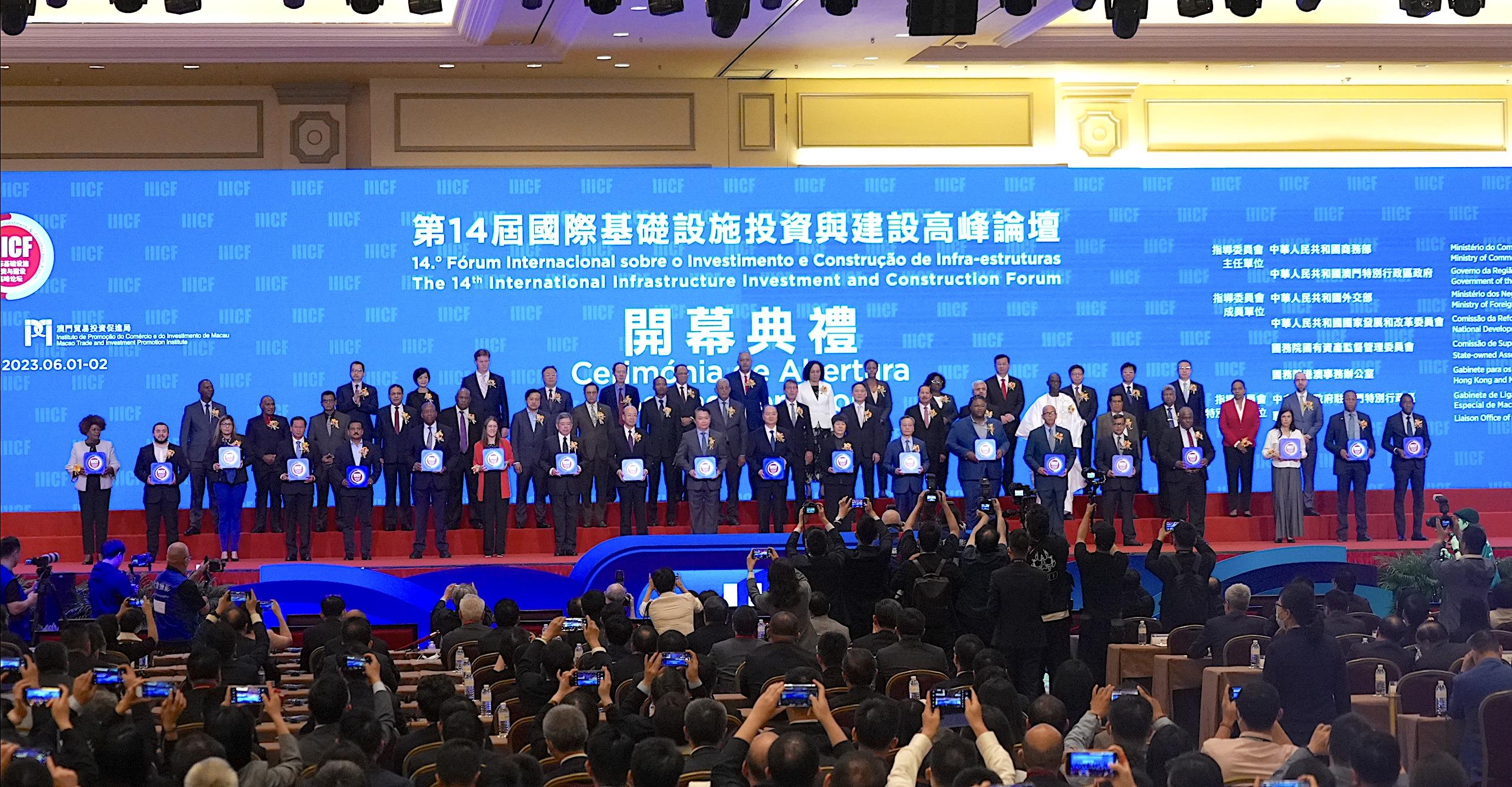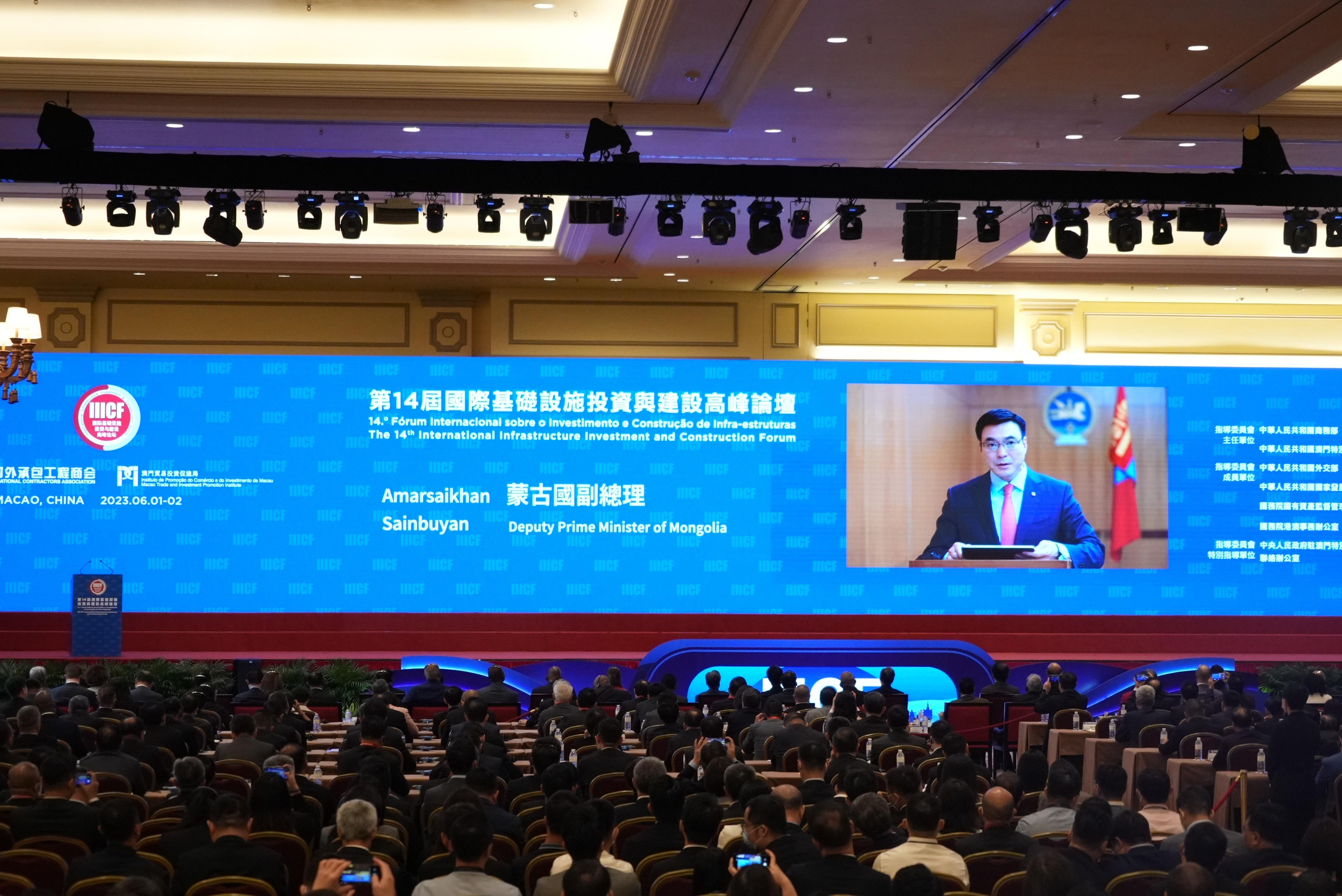 The 14th International Infrastructure Investment and Construction Forum (IIICF) is held in Macao, south China, on June 1, 2023. (LI XIANG / CHINA DAILY)
The 14th International Infrastructure Investment and Construction Forum (IIICF) is held in Macao, south China, on June 1, 2023. (LI XIANG / CHINA DAILY)
Infrastructure-featured Belt and Road Initiative in a new era of high quality is expected to boost sustainable development and benefit peoples across the developing economies, according to the 14th International Infrastructure Investment and Construction Forum (IIICF).
Running from June 1-2, the forum with over a dozen panels focuses on the theme of “Green Leadership, Digital Intelligence, Financial Empowerment, Win-Win Cooperation” in upgrading the Belt and Road Initiative to a new level.
The event is co-organized by the China International Contractors Association and the Macao Trade and Investment Promotion Institute.
Guo Tingting, vice-minister of commerce, said China is willing to work with all parties to deepen digital infrastructure cooperation, injecting new vitality into interconnectivity stressed by the BRI.
Guo noted that the digital economy has become a new engine to promote economic growth, and digital infrastructure has become an important driving force for innovation and development.
Mongolian Deputy Prime Minister Sainbuyan Amarsaikhan said Mongolia is constantly upgrading readiness of information and communication technology and capacity of its infrastructure, forming the legal environment for digitalization, and reinvigorating transparency to implement the digital transition
China is willing to work with all parties to promote investment cooperation in green infrastructure to facilitate the carbon peaking and deal with climate change, docking development needs, sharing development experiences, strengthening green finance cooperation, and making green a more distinctive "background color” for jointly building the Belt and Road Initiative, she said.
READ MORE: BRI energized by green solutions
Mongolian Deputy Prime Minister Sainbuyan Amarsaikhan, noted that within the framework of the “Vision 2050” adopted by the State Great Khural (Parliament ) in 2020, Mongolia pursues enhancing socio-economic and human developments, setting up knowledge-added sectors and enlarging transparency and openness.
He said Mongolia is constantly upgrading readiness of information and communication technology and capacity of its infrastructure, forming the legal environment for digitalization, and reinvigorating transparency to implement the digital transition.
Public information systems are “pillars of the digital transition”, Amarsaikhan said. And the Mongolian Ministry of Digital Development and Communication would be more than pleased to collaborate in green leading, digital intelligence driven finance for the sake of mutually beneficial cooperation in the area of infrastructure development.
 Mongolian Deputy Prime Minister Sainbuyan Amarsaikhan is seen on a screen delivering a speech via video link during the opening ceremony of the 14th International Infrastructure Investment and Construction Forum (IIICF) in Macao, south China, on June 1, 2023. (LI XIANG / CHINA DAILY)
Mongolian Deputy Prime Minister Sainbuyan Amarsaikhan is seen on a screen delivering a speech via video link during the opening ceremony of the 14th International Infrastructure Investment and Construction Forum (IIICF) in Macao, south China, on June 1, 2023. (LI XIANG / CHINA DAILY)
Mike Elton Mposha, Zambia’s Minister of Water Development and Sanitation, said Zambia intends to foster economic growth and development while safeguarding natural assets in order to continue to provide the resources and environmental sustainability.
ALSO READ: Summit acclaimed as major BRI boost
Within the context of sustainable development goals and our national vision 2030, Zambia employs strategies that ensure that natural assets can deliver their full economic potential on a sustainable basis.
Others major speakers included Ding Yanzhang, chairman of the Power Construction Corporation of China; Dai Hegen, chairman of the board of the China National Chemical Engineering Group Co, Ltd; and Lou Qiliang, president of the CRRC Corporation Limited. Fang Qiuchen, chairman of the China International Contractors Association, will be moderator of the opening ceremony.
At this year’s forum two reports will be released: the Report on the Belt and Road Infrastructure Development Index (2023) and the first ever Report on Portuguese-speaking Countries’ Infrastructure Development Index and Macao’s Achievements in Belt and Road Initiative (2023). They aim to more accurately reflect the new international trends of the Belt and Road Initiative (BRI) and highlight the role of the Macao SAR as a platform connecting China and Portuguese-speaking countries.
Fang, the chairman of China International Contractors Association and Wang Wen, chief economist of China Export & Credit Insurance Corporation officiated the launching ceremony of the reports.
READ MORE: Mechanism launched to promote sustainable infrastructure
Over 3,000 guests, more than doubling the figure in 2022, took part including ministerial-level officials, senior executives of financial institutions, international contractors, business associations and supply chain enterprises.
Other keynote forums include one of “Dialogue with Senior Management-Green Orientation, Financial Innovation Empowers Sustainable Development of International Infrastructure, the 9th China-LAC Infrastructure Forum and one titled “Technological Innovation, Digital & Smart Transformation Promotes Green Development of International Infrastructure”.
A series of 10 parallel forums will be presented on June 2, including the ones named “International Cooperation on New Energy”, “Innovative Solutions for Rail Transit Systems in the Digital and Intelligent Era”, “Green & Low-carbon Water Business and International Cooperation”, etc.
Florence Li in Macao contributed to this report.
vivienxu@chinadailyapac.com